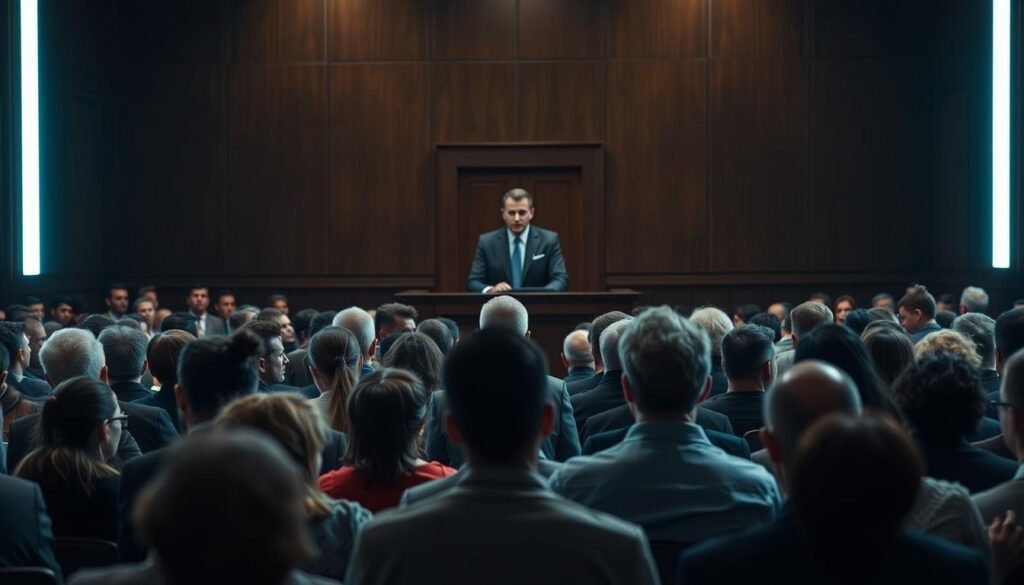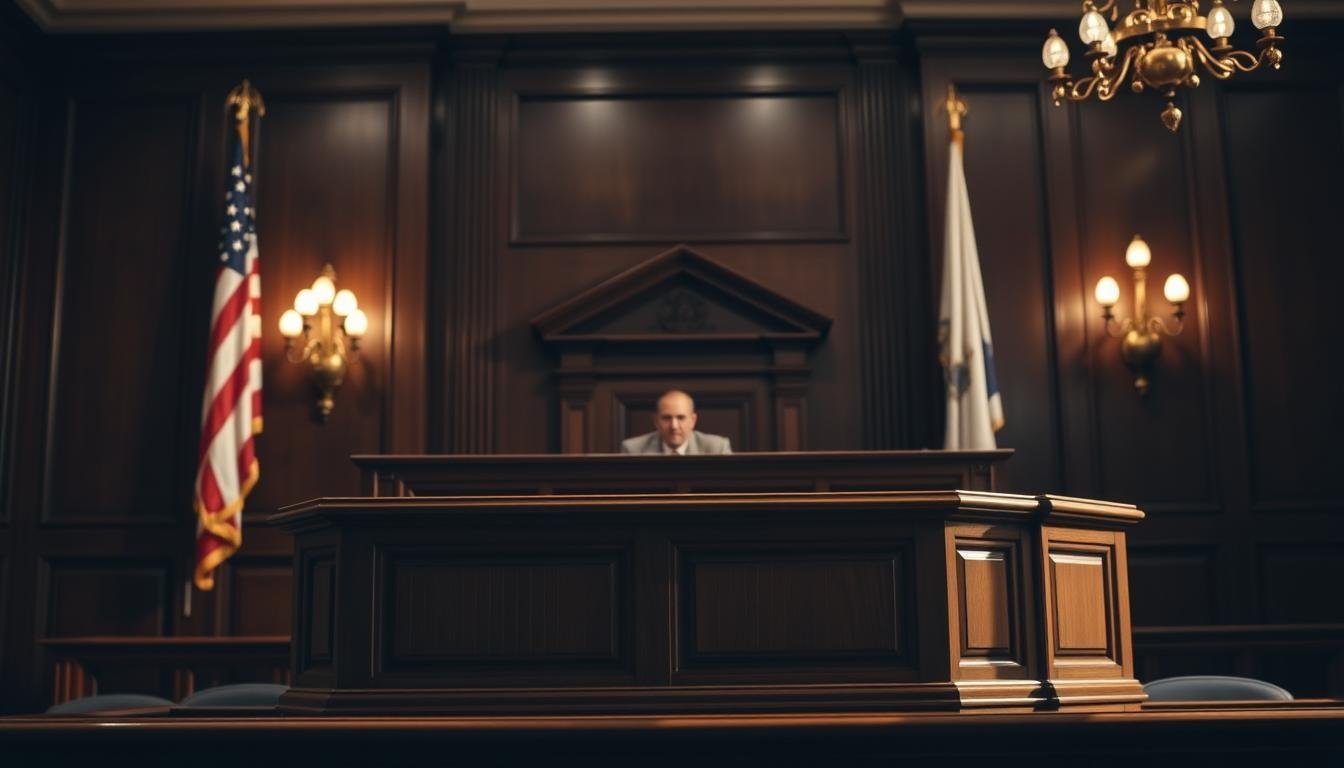Last updated on October 18th, 2025 at 06:56 pm
Can a Convicted Felon Serve on Jury Duty? Are you curious if someone with a felony can serve on a jury? You’re not the only one. The answer is not simple and changes a lot from place to place.
Jury duty eligibility depends on both state and federal laws. This makes it hard to understand, especially for those with a felony.
The rules for felon jury service vary by state. Federal courts also have their own rules. Knowing these laws is key for anyone with a felony who’s been called for jury duty.
Contents
- 1 Understanding Jury Duty Eligibility Requirements
- 2 Can a Convicted Felon Serve on Jury Duty? Federal Laws and Regulations
- 3 State-by-State Variations in Felon Jury Service Laws
- 4 Restoring Your Right to Serve on a Jury
- 5 Conclusion
- 6 FAQ: Can a Convicted Felon Serve on Jury Duty?
- 6.1 Can a convicted felon serve on jury duty in the United States?
- 6.2 How are jury lists compiled, and what sources are used?
- 6.3 What are the general requirements for jury duty eligibility?
- 6.4 How do federal laws impact jury duty eligibility for convicted felons?
- 6.5 Can you serve on jury duty if you have a felony conviction on your record?
- 6.6 What steps can you take to restore your right to serve on a jury if you have a felony conviction?
- 6.7 Are there any state-specific laws or regulations regarding jury duty for convicted felons that I should be aware of?
Understanding Jury Duty Eligibility Requirements
To be eligible for jury duty, you need to meet a few criteria. You must be a U.S. citizen, at least 18 years old, and live in the state and county where you’re called. These are the basic requirements.
How Jury Lists Are Compiled
Jury lists come from voter registration and driver’s license records. The U.S. Courts website explains that these lists help pick potential jurors randomly.
- Gathering data from voter registration lists and driver’s license records
- Randomly selecting names from these lists
- Verifying the eligibility of the selected individuals based on federal jury laws and local regulations
Knowing about these rules and how lists are made helps figure out if you’re eligible for jury duty. If you get called, you must respond and give the needed info to check if you qualify.
To be a juror, you must fit the criteria and be ready to serve for the trial’s length. Jury duty is a big civic duty. Knowing the rules is the first step to doing your part.
Can a Convicted Felon Serve on Jury Duty? Federal Laws and Regulations
Federal laws decide if a convicted felon can serve on a jury. They have specific rules. These laws control who can be on a federal jury.
Under federal law, felons can’t usually serve on a federal jury. They must have their civil rights back. The steps to get these rights back vary, so it’s key to know what’s needed.
Impact of Felony Convictions on Jury Service
A felony conviction can affect if you can serve on a jury. The Judiciary Act of 1789 and later laws set the rules for who can be on a jury.
| Status | Jury Eligibility | Restoration Process |
|---|---|---|
| Felony Conviction | No | Restoration of civil rights |
| Civil Rights Restored | Yes | Varies by jurisdiction |
To be on a federal jury, you must meet certain criteria. You need to be a U.S. citizen, at least 18, and have your civil rights back if you’ve been convicted of a felony.

It’s important to know these rules if you have a felony and want to serve on a jury. To be eligible, you must ask the right people and show you have your civil rights back.
For more details on getting your rights back, talk to a lawyer. They can help you understand the steps.
State-by-State Variations in Felon Jury Service Laws
Laws about jury duty for people with felony convictions differ a lot from state to state. Some states let people with felonies serve on juries after a set time. Others need a formal request, showing how complex these rules can be.
It’s key for those with felony convictions to know about these laws. Each state has its own rules for felons serving on juries. These rules reflect the local legal standards and policies.
Examples of State-Specific Laws and Regulations
- Automatic Restoration: Some states, like California, automatically let felons serve on juries after they’ve done their time, including any probation or parole.
- Formal Petition Required: On the other hand, states like Florida need felons to ask to have their rights back, including jury duty, after they’ve served their sentence.
- Permanent Disqualification: A few states keep felons from serving on juries for certain crimes, unless they get a pardon or have their record cleared.
These examples show how different states handle felon jury service. Laws are shaped by many things, like the crime, how long ago it was, and the person’s criminal history.
For those with felony convictions, knowing the laws in their state is crucial. They might need to look up legal resources or talk to state election or judicial offices. This helps figure out how to get back their right to serve on a jury.
As laws about felon jury service change, it’s vital for people to keep up with their rights and duties. This way, they can better understand the legal system. And they might even get to serve on a jury again.
Restoring Your Right to Serve on a Jury
Serving on a jury is a key right that can be brought back after a felony conviction. To do this, you must follow certain legal steps. If you’ve been convicted of a felony, knowing how to get your jury duty rights back is very important.
Legal Steps to Regain Eligibility
The steps to get your jury duty rights back vary by place. But, they usually involve a few main steps. You might need to ask a court for your rights back or wait a certain time, based on your state’s laws.
- Research the specific laws in your jurisdiction regarding jury duty eligibility for convicted felons.
- Determine if you need to petition a court to have your rights restored.
- Understand any waiting periods that may apply before you can be considered for jury duty again.
It’s essential to follow the legal steps carefully to ensure your eligibility is restored. This might mean filing papers, going to court, or doing other things as your area requires.
Getting your jury duty rights back is not just about a civic right. It also lets you fully join in the justice system. By knowing and following the legal steps, you can take part in this important civic duty.
For detailed advice, talk to a legal expert. They can give you advice that fits your situation and area.
See Also: Can Felons Get a Driver’s License?
Conclusion
You’ve learned that laws about jury duty for convicted felons are complex. The answer to “can a convicted felon serve on jury duty?” varies. It depends on both federal and state laws.
Federal laws set a basic framework, but each state has its own rules. Knowing these differences is key for those wanting to serve on a jury.
It’s possible to get your right to serve on a jury back. If you’re a convicted felon, learning about your state’s laws is crucial.
Understanding jury duty rules helps you move through the justice system better. It might even let you regain your right to participate.
FAQ: Can a Convicted Felon Serve on Jury Duty?
Can a convicted felon serve on jury duty in the United States?
Whether a convicted felon can serve on a jury depends on the state or federal court. Some places automatically let them serve after a time. Others need a formal request.
How are jury lists compiled, and what sources are used?
Jury lists come from voter rolls, driver’s license info, and government databases. This ensures a fair mix of the community.
What are the general requirements for jury duty eligibility?
To qualify for jury duty, you must be a U.S. citizen, 18 or older, and live in the state and county where you’re called.
How do federal laws impact jury duty eligibility for convicted felons?
Federal law bars felons from federal juries unless their rights are back. They must go through a formal process to be eligible again.
Can you serve on jury duty if you have a felony conviction on your record?
It varies by state. Some let felons serve after a time or a program. Others may not allow it at all.
What steps can you take to restore your right to serve on a jury if you have a felony conviction?
To serve on a jury again, you might need to ask a court, wait, or meet other rules. Knowing your state’s laws is key.
Are there any state-specific laws or regulations regarding jury duty for convicted felons that I should be aware of?
Yes, laws for felons on juries differ by state. Some are lenient, others strict. Always check your local laws.

Van Maldonado, born in California, holds a degree in Criminology and Police Science. Currently serving as an investigative officer at a local police station, he spends his leisure time writing insightful content for FelonScope.com.

